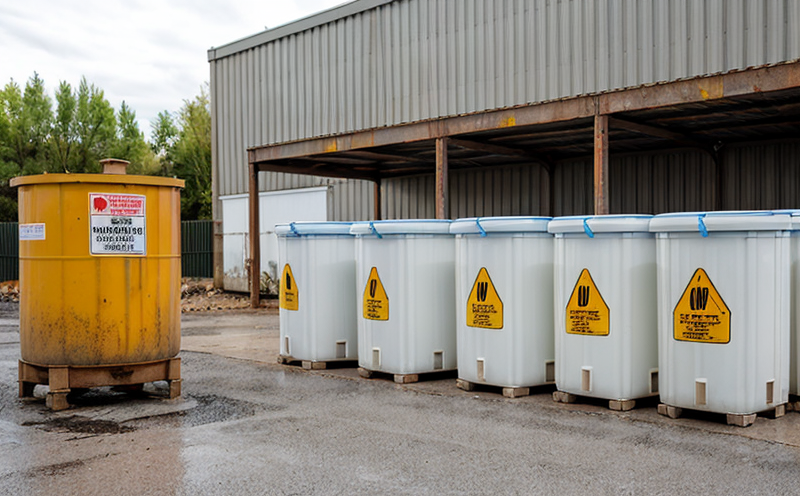
-
Chemical Safety and Certification-
Chemical Safety in Pharmaceuticals Production-
Safe Disposal of Pharmaceutical Waste Chemicals
We provide comprehensive solutions designed to help our clients mitigate risks, enhance performance, and excel in key areas such as quality, health & safety, environmental sustainability, and social responsibility.
Discover
For many years, our organization has been operating successfully, boasting modern laboratories that meet international standards. These laboratories are equipped with the latest technology devices and equipment, and we have built a strong team of experienced and trained personnel to operate them.
DiscoverWelcome to Eurolab, your partner in pioneering solutions that encompass every facet of life. We are committed to delivering comprehensive Assurance, Testing, Inspection, and Certification services, empowering our global clientele with the ultimate confidence in their products and processes.
Discover
-
Chemical Safety and Certification-
Chemical Safety in Pharmaceuticals Production-
Safe Disposal of Pharmaceutical Waste ChemicalsThe proper disposal of pharmaceutical waste chemicals is a critical aspect of chemical safety, environmental protection, and public health. Pharmaceutical waste chemicals include expired medications, unused products, solvents, raw materials, and by-products from the manufacturing process. Improper disposal of these substances can lead to significant environmental contamination, human health risks, and contribute to the growing issue of pharmaceutical pollution. To mitigate these risks, pharmaceutical companies, healthcare facilities, and consumers must adopt stringent protocols for the safe disposal of pharmaceutical waste chemicals.
When pharmaceutical waste chemicals are disposed of improperly, they can have a range of harmful impacts on the environment and public health. These risks include:
1. Environmental Contamination
2. Contribution to Antibiotic Resistance
3. Hazards to Wildlife
4. Public Health Risks
To prevent the harmful effects of pharmaceutical waste chemicals, it is essential to follow proper disposal procedures. Here are some best practices for the safe disposal of pharmaceutical waste:
1. Segregation and Categorization of Pharmaceutical Waste
2. Disposal via Certified Hazardous Waste Facilities
3. Pharmaceutical Take-Back Programs
4. High-Temperature Incineration
5. Inertization and Solidification
6. Compliance with Local, State, and Federal Regulations
1. Why is it important to dispose of pharmaceutical waste properly?
2. What are some common methods of disposing of pharmaceutical waste?
3. Can pharmaceuticals be flushed down the toilet for disposal?
4. How can pharmaceutical companies ensure safe disposal of waste chemicals?
5. Are there eco-friendly alternatives for disposing of pharmaceutical waste?
Safe disposal of pharmaceutical waste chemicals is essential for protecting the environment, public health, and wildlife. By following best practices, such as segregation, using certified disposal facilities, and participating in take-back programs, pharmaceutical companies, healthcare providers, and consumers can reduce the environmental impact of pharmaceutical waste. Additionally, compliance with regulations ensures that these substances are disposed of in a responsible manner, preventing contamination and safeguarding the well-being of future generations.

Consumer Product Safety
Consumer Product Safety: Protecting Consumers from Harmful Products As a consumer, you have the rig...

Energy and Sustainability Standards
In today’s rapidly evolving world, businesses face increasing pressure to meet global energy a...

Electrical and Electromagnetic Testing
Electrical and Electromagnetic Testing: A Comprehensive Guide Introduction Electrical and electrom...

Automotive Compliance and Certification
Automotive Compliance and Certification: Ensuring Safety and Efficiency The automotive industry is ...

Military Equipment Standards
Military Equipment Standards: Ensuring Effectiveness and Safety The use of military equipment is a ...

Transportation and Logistics Certification
Transportation and Logistics Certification: A Comprehensive Guide The transportation and logistics ...

Aviation and Aerospace Testing
Aviation and Aerospace Testing: Ensuring Safety and Efficiency The aviation and aerospace industr...

MDR Testing and Compliance
MDR Testing and Compliance: A Comprehensive Guide The Medical Device Regulation (MDR) is a comprehe...

Railway Industry Compliance
Railway Industry Compliance: Ensuring Safety and Efficiency The railway industry is a critical comp...

Chemical Safety and Certification
Chemical safety and certification are critical in ensuring the safe management of products and proce...

Hospitality and Tourism Certification
Hospitality and Tourism Certification: Unlocking Opportunities in the Industry The hospitality and ...

NEBS and Telecommunication Standards
Network Equipment Building System (NEBS) and Telecommunication Standards The Network Equipment Bu...

Construction and Engineering Compliance
Construction and Engineering Compliance: Ensuring Safety, Quality, and Regulatory Adherence In the ...

Industrial Equipment Certification
Industrial equipment certification is a critical process that ensures industrial equipment meets spe...

Trade and Government Regulations
Trade and government regulations play a vital role in shaping the global economy. These regulations ...

Environmental Simulation Testing
Environmental Simulation Testing: A Comprehensive Guide In todays world, where technology is rapidl...

IT and Data Center Certification
IT and Data Center Certification: Understanding the Importance and Benefits The field of Informatio...

Fire Safety and Prevention Standards
Fire Safety and Prevention Standards: Protecting Lives and Property Fire safety and prevention stan...

Food Safety and Testing
Food Safety and Testing: Ensuring the Quality of Our Food As consumers, we expect our food to be sa...

Pharmaceutical Compliance
Pharmaceutical compliance refers to the adherence of pharmaceutical companies and organizations to l...

Lighting and Optical Device Testing
Lighting and Optical Device Testing: Ensuring Performance and Safety Lighting and optical devices a...

Healthcare and Medical Devices
The Evolution of Healthcare and Medical Devices: Trends, Innovations, and Challenges The healthcare...

Cosmetic Product Testing
The Complex World of Cosmetic Product Testing The cosmetics industry is a multi-billion-dollar ma...

Renewable Energy Testing and Standards
Renewable Energy Testing and Standards: Ensuring a Sustainable Future The world is rapidly transiti...

Pressure Vessels and Installations Testing
Pressure Vessels and Installations Testing Pressure vessels are a critical component of various ind...

Battery Testing and Safety
Battery Testing and Safety: A Comprehensive Guide As technology continues to advance, battery-power...

Agricultural Equipment Certification
Agricultural equipment certification is a process that ensures agricultural machinery meets specific...

Product and Retail Standards
Product and Retail Standards: Ensuring Quality and Safety for Consumers In todays competitive marke...

Electromechanical Safety Certification
Electromechanical Safety Certification: Ensuring Compliance and Protecting Lives In todays intercon...

Environmental Impact Assessment
Environmental Impact Assessment: A Comprehensive Guide Environmental Impact Assessment (EIA) is a c...